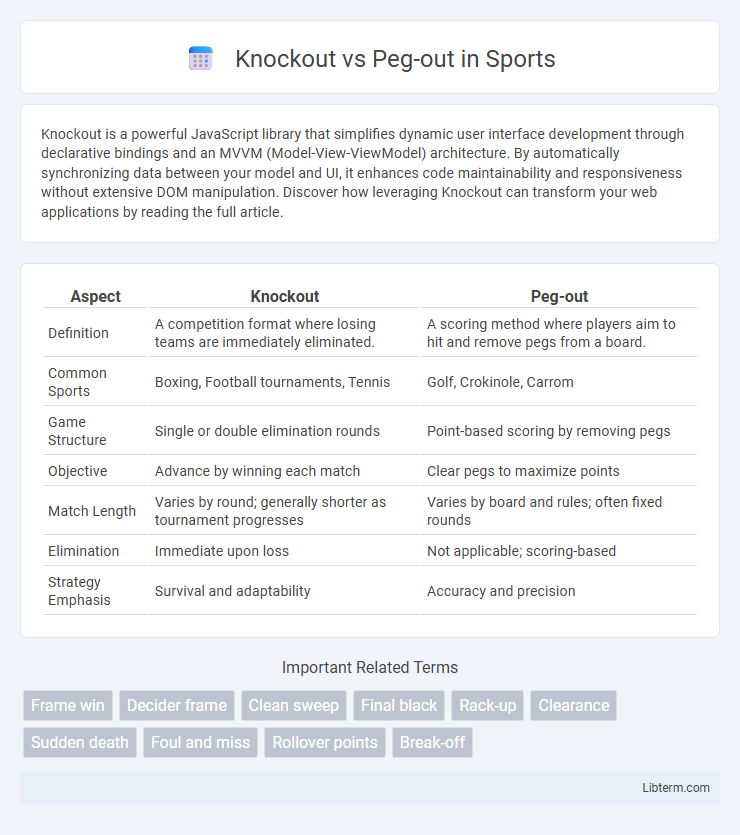Knockout is a powerful JavaScript library that simplifies dynamic user interface development through declarative bindings and an MVVM (Model-View-ViewModel) architecture. By automatically synchronizing data between your model and UI, it enhances code maintainability and responsiveness without extensive DOM manipulation. Discover how leveraging Knockout can transform your web applications by reading the full article.
Table of Comparison
| Aspect | Knockout | Peg-out |
|---|---|---|
| Definition | A competition format where losing teams are immediately eliminated. | A scoring method where players aim to hit and remove pegs from a board. |
| Common Sports | Boxing, Football tournaments, Tennis | Golf, Crokinole, Carrom |
| Game Structure | Single or double elimination rounds | Point-based scoring by removing pegs |
| Objective | Advance by winning each match | Clear pegs to maximize points |
| Match Length | Varies by round; generally shorter as tournament progresses | Varies by board and rules; often fixed rounds |
| Elimination | Immediate upon loss | Not applicable; scoring-based |
| Strategy Emphasis | Survival and adaptability | Accuracy and precision |
Introduction to Knockout and Peg-out
Knockout and Peg-out are key risk management mechanisms in options trading designed to limit losses and protect profits. Knockout options automatically terminate the position once the underlying asset's price hits a predetermined barrier, while Peg-out triggers the closure when a specified price is reached. Understanding these tools helps traders control exposure and execute strategies aligned with market movements.
Definitions: What is Knockout?
Knockout refers to a contract feature that automatically terminates the agreement when the underlying asset's price reaches a predetermined barrier level, effectively eliminating the contract's validity. This mechanism helps investors manage risk by setting clear exit points in volatile markets. Knockout options are commonly used in forex, commodities, and equity derivatives to limit potential losses or lock in profits.
Understanding Peg-out: A Clear Overview
Peg-out refers to the process of unlocking collateral in a decentralized finance (DeFi) system after a position has been closed or settled, enabling users to retrieve their assets seamlessly. Unlike knockout options that automatically terminate upon hitting a specified price barrier, peg-out ensures that users reclaim their locked funds without loss or delay once the underlying conditions are met. Understanding peg-out mechanisms is crucial for managing risk and liquidity efficiently in synthetic asset platforms and DeFi protocols.
Key Differences Between Knockout and Peg-out
Knockout and peg-out are distinct concepts in trading and betting environments where knockout refers to a sudden elimination of a position once a specific price barrier is hit, preventing further losses or gains. Peg-out involves setting a fixed exit point or price target for an asset, allowing the position to close automatically at a predefined profit or loss level. The key differences lie in knockout's immediate barrier-triggered closure versus peg-out's conditional, planned exit strategy based on set price targets.
Applications in Sports and Games
Knockout tournaments eliminate players or teams after a single loss, creating high-stakes matches ideal for competitive sports like soccer, boxing, and esports. Peg-out scoring, commonly used in games like cribbage and darts, tracks cumulative progress rather than elimination, enhancing strategic depth and player engagement over multiple rounds. Both formats shape gameplay dynamics by emphasizing either survival through rounds or tactical point accumulation, influencing how competitions are structured and experienced.
Advantages of Knockout Systems
Knockout systems provide precise on/off control by directly interrupting the current, minimizing energy loss and heat generation compared to peg-out systems that rely on mechanical friction. These systems offer faster response times and greater durability, making them ideal for high-frequency switching applications in industrial automation and power electronics. Enhanced reliability and reduced maintenance costs further position knockout technology as a superior choice for efficient and sustainable electrical control solutions.
Benefits of Peg-out Formats
Peg-out formats offer significant advantages by providing a more streamlined and quicker resolution process compared to knockout rounds, reducing downtime between matches and maintaining viewer engagement. The structure eliminates the uncertainty of multiple elimination stages, ensuring that teams can focus their strategies on a definitive, high-stakes final match. This format enhances audience retention and sponsor appeal by delivering concise, action-packed competition with clear and immediate outcomes.
Common Mistakes in Using Knockout vs Peg-out
Common mistakes in using Knockout vs Peg-out involve confusing their functions in PCB design; Knockout removes defined board areas to fit components or connectors, while Peg-out creates non-electrical holes for alignment or support. Designers often misuse Knockout as a mounting hole or misapply Peg-out for component clearance, leading to manufacturing errors. Accurate application requires understanding Knockout's role in isolating copper layers and Peg-out's purpose in mechanical alignment to ensure precise board assembly.
Choosing the Right Format: Factors to Consider
Choosing between Knockout and Peg-out formats involves evaluating factors such as audience engagement, message clarity, and design consistency. Knockout text, where background colors or patterns are removed to highlight text, works best for bold, high-contrast visuals, enhancing readability against complex backgrounds. Peg-out, which involves outlining text to create separation from backgrounds, offers greater flexibility for various design contexts and helps maintain legibility without overpowering surrounding elements.
Conclusion: Knockout or Peg-out?
Choosing between knockout and peg-out options depends on specific investment goals and risk tolerance. Knockout options provide defined risk limits and potentially higher leverage, ideal for traders seeking quick exits at predetermined levels. Peg-out options offer flexibility in execution with dynamic pricing, better suited for investors prioritizing market direction over strict stop-loss triggers.
Knockout Infographic

 libterm.com
libterm.com